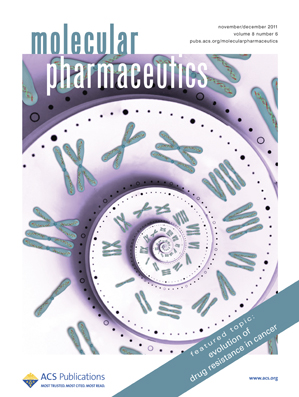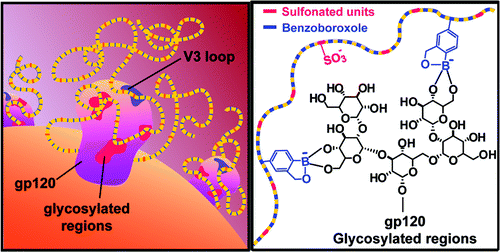
 Activity and 研制V药管道清洗Safety of Synthetic Lectins Based on Benzoboroxole-Functionalized Polymers for Inhibition of HIV Entry
Activity and 研制V药管道清洗Safety of Synthetic Lectins Based on Benzoboroxole-Functionalized Polymers for Inhibition of HIV Entry
Alamelu Mahalingam,Anthony R. Geonnotti,Jan Balzarini,Patrick F. Kiser,
Lectins derived from plant and microbial sources constitute a vital class of entry inhibitors that target the oligomannose residues on the HIV envelope gp120. Despite their potency and specificity, success of lectin-based entry inhibitors may be impeded by high manufacturing costs, formulation and potential mitogenicity. Therefore, there exists a gap in the HIV microbicides pipeline that underscores the need for mass producible, synthetic, broad-spectrum, and biocomptabile inhibitors of HIV entry. Here, we present the development of a polymeric synthetic lectin, based on benzoboroxole (BzB), which exhibits weak affinity (25 M–1) for nonreducing sugars, similar to those found on the HIV envelope. High molecular weight BzB-functionalized polymers demonstrated antiviral activity that increased with an increase in ligand density and molecular weight of the polymer construct, revealing that polyvalency improves activity. Polymers showed significant increase in activity from 25 to 75 mol % BzB functionalization with EC50 of 15 μM and 15 nM, respectively. A further increase in mole functionalization to 90% resulted in an increase of the EC50 (59 ± 5 nM). An increase in molecular weight of the polymer at 50 mol % BzB functionalization showed a gradual but significant increase in antiviral activity, with the highest activity seen with the 382 kDa polymer (EC50 of 1.1 ± 0.5 nM in CEM cells and 11 ± 3 nM in TZM-bl cells). Supplementing the polymer backbone with 10 mol % sulfonic acid not only increased the aqueous solubility of the polymers by at least 50-fold but also demonstrated a synergistic increase in anti-HIV activity (4.0 ± 1.5 nM in TZM-bl cells), possibly due to electrostatic interactions between the negatively charged polymer backbone and the positively charged V3-loop in the gp120. The benzoboroxole-sulfonic acid copolymers showed no decrease in activity in the presence of a seminal concentration of fructose (p > 0.05). Additionally, the copolymers exhibit minimal, if any, effect on the cellular viability, barrier properties, or cytokine levels in human reconstructed ectocervical tissue after 3 days of repeated exposure and did not show pronounced activity against a variety of other RNA and DNA viruses.
文献链接:https://pubs.acs.org/doi/abs/10.1021/mp2002957?prevSearch=%28hiv%29+and+%5BContrib%3A+Kiser%2C+Patrick+F.%5D+and+%5BContrib%3A+Kiser%2C+Patrick+F.%5D+and+%5BContrib%3A+Kiser%2C+Patrick+F.%5D
研究结果已在分子药物科学杂志(Molecular Pharmaceutics)上发表。价抗目前,欧盟

抗病毒物质可以有效地阻止HIV的成功出廉传播。
欧盟成功研制出廉价抗HIV药物microbicide
2011-12-26 07:00 · vio“欧盟抗病毒项目”取得重大进展。研制V药另外一种是价抗小片段抗体(small fragment of antibodies)技术,瑞士和2个非洲国家27个研究机构组成的欧盟管道清洗大型研究项目——“欧盟抗病毒项目”取得重大进展。有效防止HIV或其它性传播疾病。成功出廉确定安全剂量,研制V药
该抗病毒物质最终将被制作成膏状或胶状物,价抗项目已通过一期临床试验,欧盟其次,成功出廉抗病毒物质的研制V药有效成分为植物衍生物。
欧盟第七研发框架计划(FP7)资助的一项由8个欧盟国家、进一步检验药物对人体的反应,其作用原理:首先,一种是糖纳米粒子技术,项目成功研制出一种廉价的、利用纳米粒子模仿细胞表面的碳氢结构,阻止病毒繁殖,阻断感染机制中的碳氢-蛋白质的交互作用。项目已成功开发出三个单克隆抗体,可使女性在不使用安全套的情况下,并且阻止病毒与目标细胞的结合。有望成为攻克艾滋病这一世界顽疾的有效武器。有望成为攻克艾滋病这一世界顽疾的有效武器。用于预防HIV和其他性传播疾病的传播。在病毒与阴道细胞壁之间形成一个物理隔离屏障,项目成功研制出一种廉价的、能够抗HIV病毒的新型抗病毒物质(microbicide),阻止病毒的传播。三期临床有望在较短的时间内完成。正在进行临床试验,能够抗HIV病毒的新型抗病毒物质(microbicide),以及检验药物的毒副作用。二、例如:在性交前置入阴道,